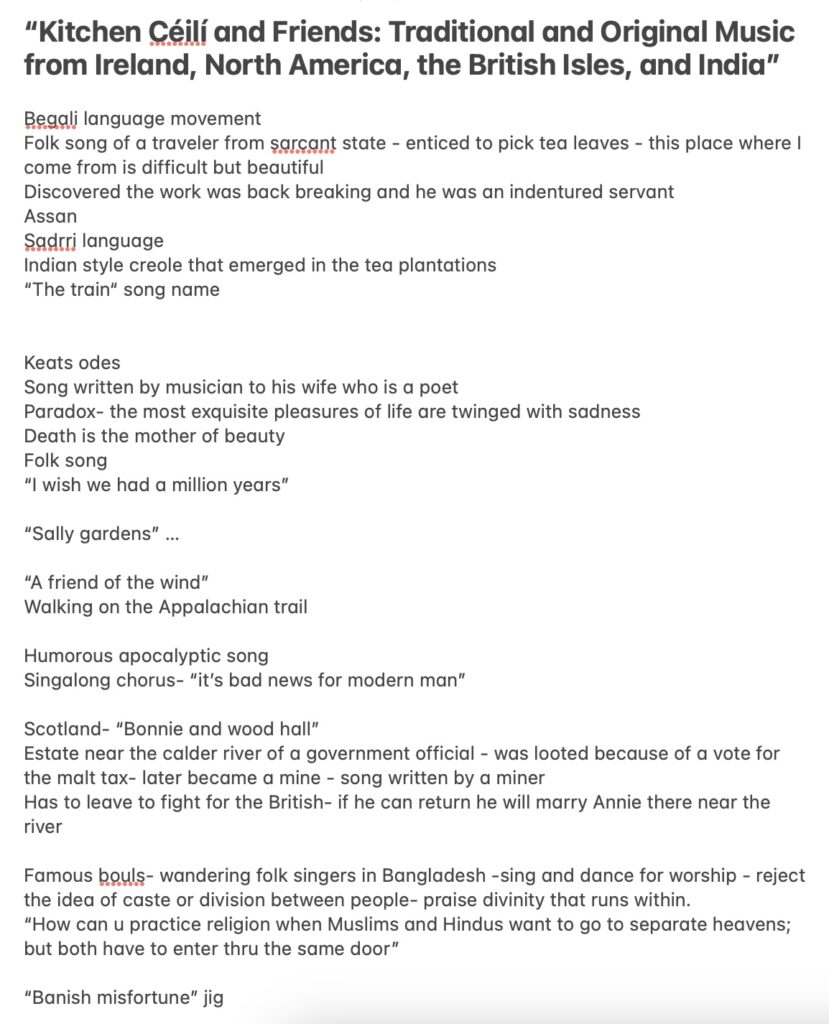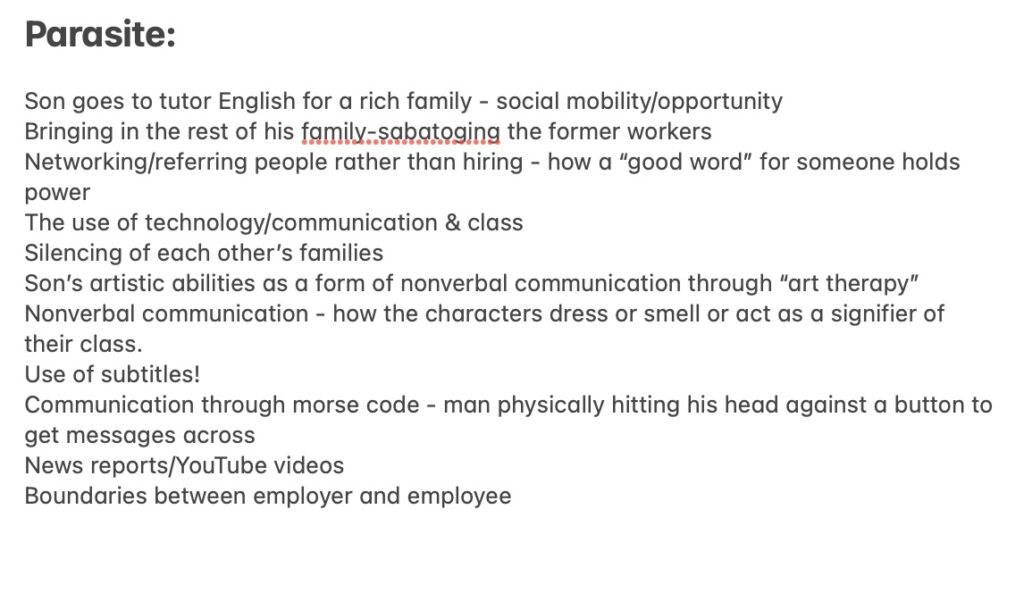Kitchen Céilí and Friends: Traditional and Original Music from Ireland, North America, the British Isles, and India:
In this concert, language and song functioned primarily as a vehicle for history and folk tales. It was especially interesting to be a part of this concert because, in a week centered around the power of language, it seemed essential to focus on music as a sort of universal language. The artists shared their pieces and took the time between each to recount a short origin story or personal anecdote to draw out a framing for the songs. At the start of the event they began with an Irish jig and revealed how two of the musicians had spent their time on a trip to Dublin, Ireland to study the music culture and techniques. The immediate excitement and vitality of the piece drew the audience in with no actual words being used. Understanding the song as a celebration was natural through the motion of the musicians themselves as well as the pace and rhythm that vibrated through the concert hall.
Following this first song, the artist brought the audience along in their travels once more as the next piece was from a trip to Kolkata, India. This next work was sung in the Sadri language and the musicians were accompanied by two more vocalists. We were told, at the beginning, that the folk song depicted a traveler enticed to pick tea leaves who sang about his home region as a wonder of difficulty and beauty. As he traveled optimistically for work, his aspirations were met with a harsh reality of indentured servitude that enveloped him and trapped him on this tea plantation. The musician explained this history and added that the Sadri language was a sort of Indian style creole that emerged in tea plantations as a result of all of the different cultures mixing and sharing their respective languages. Here, the Sadri language itself, and its use within the song, added another element of community and the power of a folk song to call upon the hardships or dreams of a larger collective. All of the different people who would come together on the tea plantations became represented by a new form of communication and language. Similar to what we talked about this past week with speech communities, the physical language signifies a social movement. This song was called “The Train”, and although I could not understand any of the Sadri words being sung, the air of the music presented noticeable shifts as this folk traveler leaves his hometown and falls into the poverty of his new labor. From the change in physical music notes to the stopping and starting of percussion, and so forth, the music took on a plotline of its own, drawing out the emotion of the story from every audience member, whether they could speak the words or not.
The next piece was an original, written by a guitarist and vocalist on stage and created for his wife, a poet. He explained their mutual love for poetry and Keats Odes that they are particularly fond of. The artist went on to state that a central paradox of these writings is that ‘the most exquisite pleasures of life are tainted with sadness’, the sadness of knowing it must end eventually. The group then began the song, “I wish we had a million years”, and the room swelled up with a heavy flute section. While this song was in English, and therefore I could understand much more of the direct plot, I found it amazing to think about the conversion of language and poetry into song. How do these forms pull from one another, resemble one another, or inspire one another in creation?
The concert carried on with different pieces from India, Bangladesh, Scotland, The US, and more, however, my favorite moment was at the close of the concert as the musicians performed another Irish jig titled “Banish Misfortune”. As the instruments leapt up and down and the piece exploded forward with noise from the flute, violin, guitars, and percussion altogether, the 3 dancers went up onto the stage and accompanied the music with tap shoes. In thinking about different avenues of language, the dancers provided a physical representation of the celebratory song. Through their addition audience members could visualize the meaning of the piece in yet another medium, and again, no words were necessary. Overall the concert was an incredible avenue of exploring the possibilities of language through verbal and non-verbal forms of creation.
Parasite:
Throughout this movie both verbal and non-verbal communication play a huge role in the division of classes and characters. Ranging from the clothes people wear, how they act, and their access to technology, to how resourceful they can be with morse code, art portraits, etc, the numerous modes of language coincide with the opportunities and successes presented to each character. While there are many different options, I would like to focus on the use of English throughout the plot. At the beginning, the son of the Kim family, Ki-woo, is presented with a work opportunity to work as an English tutor for a rich family. Although Kim Ki-woo does not have a university education, his English abilities provide him with this well paying position, granted that he lies about his lack of formal schooling.
The son begins tutoring at the rich family’s home and he is even given an English name of “Kevin”. Although his work with the daughter in his English studies is not the most promising, his own English and his ‘rich person’ posturing does allow him to maintain his job and even set his own family up as the housekeeper, driver, and art teacher for the rich Park family. Here, English acts as a clear tool for social mobility and upward trajectory, but only if it is accompanied by the correct mannerisms and conduct. Parasite combines the verbal and the non-verbal as it underscores the comical acting that each of these characters take on as they step into their new roles. The maintenance of wealth as it is based on the social protocols in place is mocked throughout the film. Ki-woo’s ‘good word’ or recommendation in finding an art teacher, driver, and housekeeper, is demonstrated to hold significant power. In acting in accordance with social prestige and high-demand, the poorer Kim family is able to extort all kinds of money and information from the exorbitantly rich Park family only from a verbal recommendation. Furthermore, the role of each Kim family member is matched by an according level of language and expression. While the fake English tutor and fake art teacher are able to speak their minds more easily, the fake chauffeur and fake housekeeper are still restrained at a certain level of distance from their employers. They must be more cautious in how they communicate with the Park family and what they are given liberty to comment on because the social standing of their roles is still seen as much lower. Ironically, the chauffeur and housekeeping roles are shown to be more demanding work wise than the english tutor who makes out with his pupil or the art teacher who sits alongside a young boy as he colors. Despite the work disparity, prestige as verbal and non-verbal signs are still shown to hold more power over the amount of work truly being done. Again, in Parasite, the arbitrary class divides are exposed for their ridiculousness as the Kim family takes control in the Park household solely on the connection and English abilities of their son.

